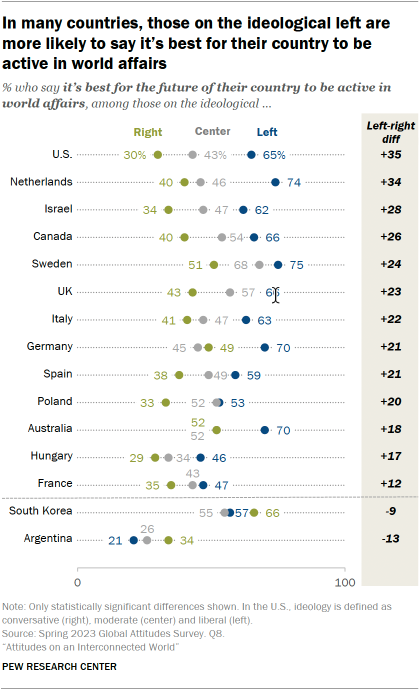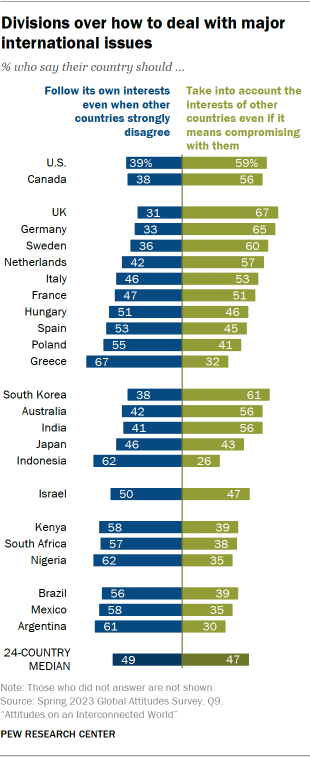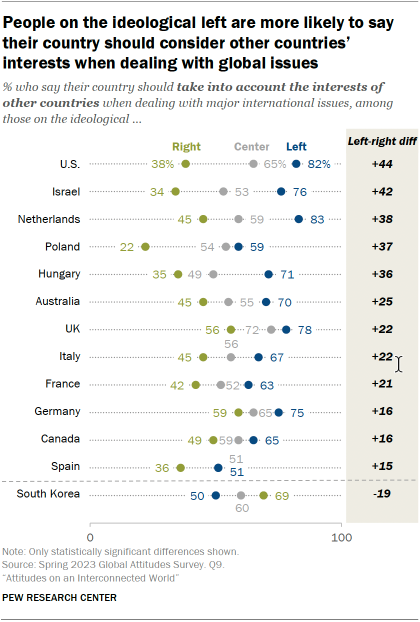Publics in 24 countries around the world are generally more inclined to believe their country should pay more attention to problems at home rather than focus on international concerns. A median of 55% across these nations say their country should pay less attention to problems in other countries and concentrate on problems domestically, while 43% say it is best for the future of their country to be active in world affairs.
These domestically focused views are particularly widespread among people in the eight middle-income nations surveyed (Argentina, Brazil, India, Indonesia, Kenya, Mexico, Nigeria and South Africa, as determined by the World Bank). A median of 63% across these countries say their country should play less attention to problems in other countries, compared with 52% of those in advanced economies.
The share who prefer being active in world affairs is highest in Japan, where 68% have this opinion. Majorities in Australia, South Korea and Sweden are also more likely to prefer being active in international affairs over focusing on domestic problems.

There are strong ideological differences when it comes to views of international engagement. In many countries, people on the left are much more likely than those on the right to say it is best for their country to be active in world affairs.
This divide is largest in the U.S., where 65% of liberals say it is best to be active in world affairs, compared with 30% of those on the right. Liberals and conservatives have diverged on this question since 2019. However, over the past four years, the ideological gap has increased as conservatives have grown less likely to say it is best to be active in world affairs.
Double-digit differences between the left and the right are also present in 12 other countries, primarily in Europe.
In two countries – South Korea and Argentina – the pattern is reversed. People on the right are more likely than those on the left to prefer engaging in world affairs.
People who say they feel close to people all over the world are also more likely to say it is best to be active in world affairs in most of the countries polled.
In many countries surveyed, those who say it is best for the future of their country to be active in world affairs are more likely to have a favorable view of the United Nations than those who say they should pay less attention to problems in other countries. In the Netherlands, for example, 86% of those who say it is best to be active internationally have a positive opinion of the UN, compared with 58% of those who prefer paying less attention to other countries.
Young adult attitudes toward international engagement: Findings from focus groups
To explore young adult attitudes toward international engagement in more depth and hear from this group in their own words, Pew Research Center conducted 16 focus groups across France, Germany, the UK and the U.S. in 2022. The groups were stratified by both ideology and whether participants preferred their country to be active in world affairs or wanted to concentrate on domestic issues. The groups highlighted the ways in which there are differences within the left and right over how countries should engage with the rest of the world.
- Left-leaning, internationally engaged people believe their country has a moral duty to be involved in the world and help countries with fewer resources than their own. They have some doubt, however, that their country’s leadership pursues involvement abroad for the right reasons.
- Left-leaning, domestically focused people also feel a moral obligation to help overseas. But skepticism about their government and a widespread sense that their own country needs dramatic changes leads them to prioritize “getting their own house in order.”
- Right-leaning, domestically focused people see their country in a state of economic distress. They feel that their country’s resources are limited and that it is more important to focus on domestic issues than to send resources abroad – and that their country should strive for self-sufficiency.
- Right-leaning, internationally engaged people believe their country is intertwined with others and feel there are economic and security benefits to being open to the world and collaborating with other countries.
For more on young adult attitudes toward international engagement, read “How Young Adults Want Their Country To Engage With the World.”
Views of taking other countries’ interests into account

Publics are generally divided when it comes to the degree to which their country should account for the interests of other nations. A median of 49% across 24 countries say their country should follow its own interests on international issues, even when other countries strongly disagree. And a median of 47% say their country should take into account the interests of other countries even if it means making compromises with them.
Majorities in the U.S. and Canada prefer to take other countries interests into account, as do similar shares in Germany, the Netherlands, Sweden and the UK. People in Poland and Greece, however, are more inclined to want their country to follow its own interests.
In the Asia-Pacific region, majorities in three of the five countries surveyed say it is important to consider other countries’ interests. Opinion is mixed in Japan, while 62% of Indonesians say Indonesia should follow its own interests.
Across the sub-Saharan African and Latin American countries polled, majorities say their country should follow its own interests over considering the interests of other countries.

The share who say their country should follow its own interests has increased in a few places since this question was asked in 2020. In the U.S., the percentage who hold this view has increased 7 percentage points, from 32% to 39%. And in Spain, people are 13 points more likely to prefer following their own interests. However, in Australia, 56% say their country should take others’ interests under consideration, up from 37% who said the same in 2020.
People on the left are more likely than those on the right to say their country should account for the interests of others. The gap is particularly large in the U.S., where 82% of liberals hold this view, compared with 38% of conservatives.
In South Korea, however, 69% of those on the right say their country should consider other countries, compared with half of those on the left.
In many countries, those who consider themselves close to the world are also more likely to say their country should consider others’ interests.




